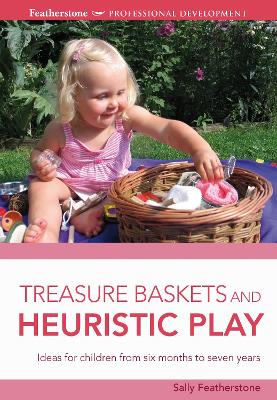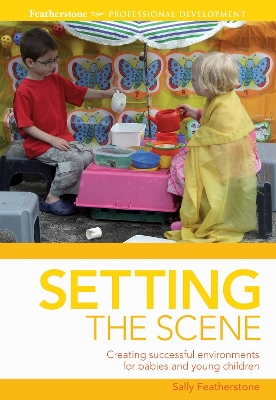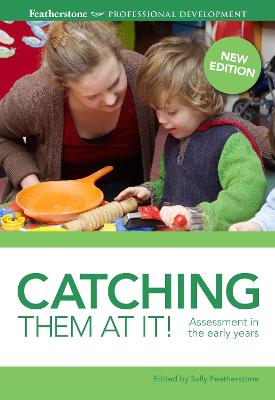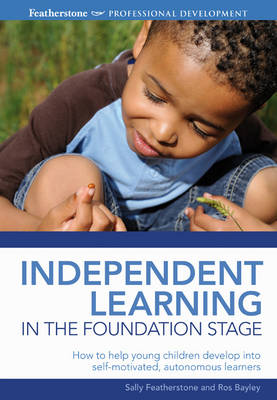Professional Development
4 total works
Heuristic Play is a tightly described, but freely accessed activity, using a specific range of 'found' or everyday objects, and, in its pure sense, is only really applicable to a specific age range (from 12 months to about two and a half).
However, there is now plenty of...Read more
However, there is now plenty of...Read more
Heuristic Play is a tightly described, but freely accessed activity, using a specific range of 'found' or everyday objects, and, in its pure sense, is only really applicable to a specific age range (from 12 months to about two and a half).
However, there is now plenty of evidence that heuristic play has continuing value for children throughout the Foundation Stage and well into the primary years. Collections of objects, carefully selected and offered in both adult-led and child-initiated sessions, indoors and outside, can build on the experience of treasure baskets
In this informative and helpful book you will find further information on the process of using both treasure baskets and heuristic play with babies and young children. You will also find chapters which explore the benefits of heuristic play with objects for children throughout the early years from six months to seven years. Of course, the materials, the provision and the adult role will develop and change as children mature, so this book also gives guidance on how heuristic play itself should change to meet the needs of children at different stages of development.
However, there is now plenty of evidence that heuristic play has continuing value for children throughout the Foundation Stage and well into the primary years. Collections of objects, carefully selected and offered in both adult-led and child-initiated sessions, indoors and outside, can build on the experience of treasure baskets
In this informative and helpful book you will find further information on the process of using both treasure baskets and heuristic play with babies and young children. You will also find chapters which explore the benefits of heuristic play with objects for children throughout the early years from six months to seven years. Of course, the materials, the provision and the adult role will develop and change as children mature, so this book also gives guidance on how heuristic play itself should change to meet the needs of children at different stages of development.
This book explores the importance of the environment in the Early Years
and its effect on learning and emotional development. It provides
examples of excellent settings for learning as well as lots of ideas
for organisation, planning, displays and making changes. It will
inspire practitioners with its full colour...Read more
and its effect on learning and emotional development. It provides
examples of excellent settings for learning as well as lots of ideas
for organisation, planning, displays and making changes. It will
inspire practitioners with its full colour...Read more
This book explores the importance of the environment in the Early Years
and its effect on learning and emotional development. It provides
examples of excellent settings for learning as well as lots of ideas
for organisation, planning, displays and making changes. It will
inspire practitioners with its full colour photos and practical, easy
to follow activities!
and its effect on learning and emotional development. It provides
examples of excellent settings for learning as well as lots of ideas
for organisation, planning, displays and making changes. It will
inspire practitioners with its full colour photos and practical, easy
to follow activities!
Fully updated to match the revised EYFS Framework, this book takes practitioners step-by-step through the assessment process. It explains the terminology involved, demonstrates how to turn 'observation' into 'assessment', and sets out how to manage and interpret all the information you have gathered.
Making assessment enjoyable, manageable...Read more
Making assessment enjoyable, manageable...Read more
Fully updated to match the revised EYFS Framework, this book takes practitioners step-by-step through the assessment process. It explains the terminology involved, demonstrates how to turn 'observation' into 'assessment', and sets out how to manage and interpret all the information you have gathered.
Making assessment enjoyable, manageable and useful, Catching Them At It! is full of practical ideas and research-based advice. Including helpful checklists and thorough explanations of methods and terminology throughout, this book is an essential resource for all early years bookshelves.
Making assessment enjoyable, manageable and useful, Catching Them At It! is full of practical ideas and research-based advice. Including helpful checklists and thorough explanations of methods and terminology throughout, this book is an essential resource for all early years bookshelves.
Independent Learning in the Foundation Stage
by Sally Featherstone and Ros Bayley
Published 21 February 2011
Developing children as independent learners starts in the early years. Scientific evidence as well as the experience of experts confirms that children between three and six learn most effectively by doing. This work looks at the theory of independent learning and describes how practitioners can plan and resource the...Read more
Developing children as independent learners starts in the early years. Scientific evidence as well as the experience of experts confirms that children between three and six learn most effectively by doing. This work looks at the theory of independent learning and describes how practitioners can plan and resource the early years.



